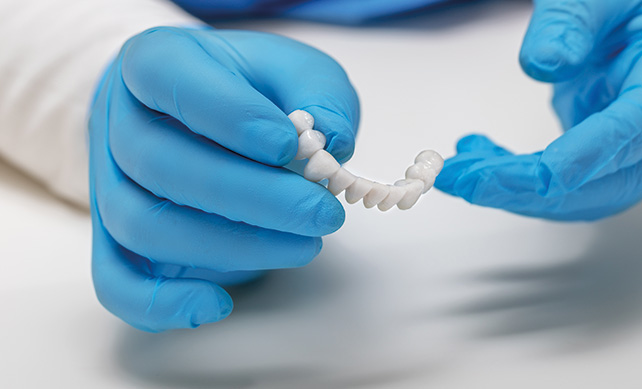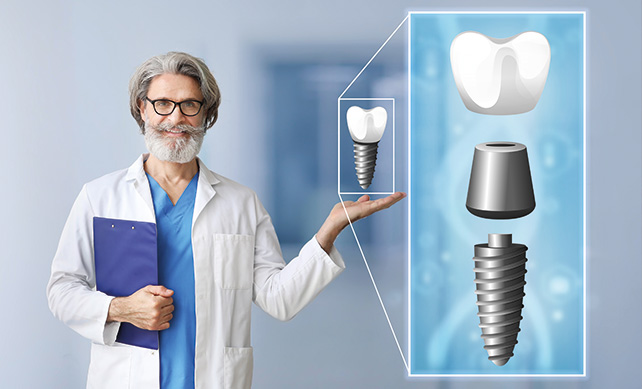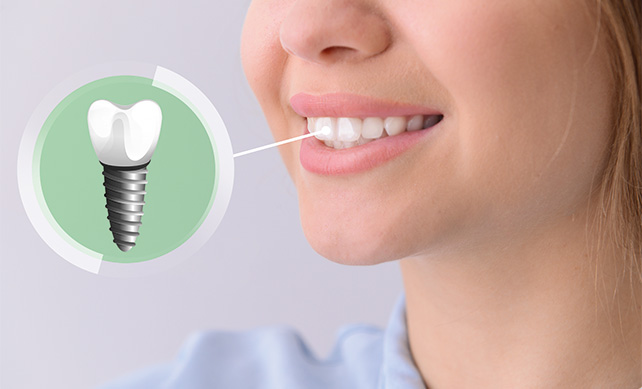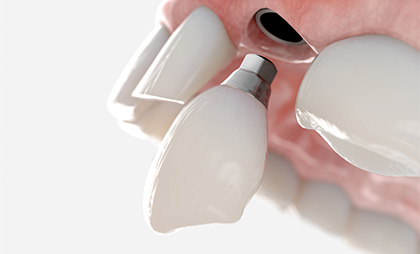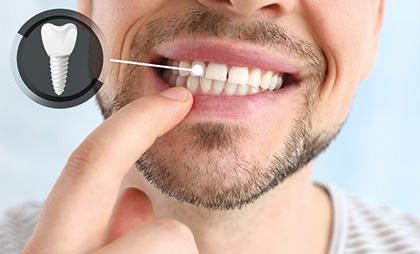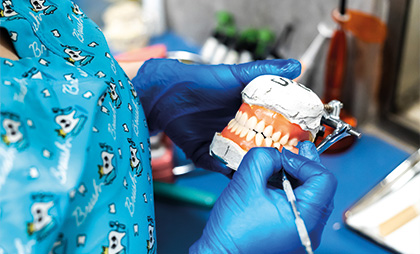Zirconium Implants
What Is A Zirconium Implant Procedure
Zirconium implants are a type of dental implant made from the metal zirconium, and they’re FDA-approved. Dental implants are used to replace missing or damaged teeth. They consist of an artificial tooth root surgically implanted into the jawbone, fusing with the bone over time. Zirconium implants are an alternative to traditional titanium implants, the most commonly used type of dental implant. Zirconium is a biocompatible material, which means that it is well-tolerated by the human body and does not cause immune responses or allergic reactions. Additionally, zirconium is tooth-colored, which can make it a more aesthetically pleasing option for some patients.
Zirconium implants have been shown to have success rates similar to titanium implants in terms of durability and long-term functionality. However, they may be more expensive than titanium implants due to their higher-cost materials and manufacturing process. Ultimately, choosing zirconium and titanium implants depends on a patient’s needs and preferences. The decision to select the implant should be made in consultation with a qualified dental professional.
Candidates For Zirconium Implants
Generally, anyone who is a candidate for traditional titanium dental implants is also a candidate for zirconium implants. However, there are some situations where zirconium implants may be preferred over titanium implants. Some factors that may make a patient a good candidate for zirconium implants are as follows:
- Allergies or sensitivities to metals: Zirconium implants offer a metal-free option for patients with metal allergies or sensitivities to metals.
- Aesthetic concerns: Zirconium implants are tooth white-colored, making them a more aesthetically pleasing option for patients, especially for patients who need implants in the front of the mouth where the implants are visible.
- Thin gums or thin jawbone: Zirconium implants may be preferred in cases where the patient has thin gums or a thin jawbone.
- Sensitive teeth: Zirconium implants have a lower thermal conductivity than titanium implants, which means they may be more comfortable for patients who are sensitive to hot or cold temperatures.
- Existing metal restorations: If a patient already has metal restorations in their mouth, such as metal crowns or bridges, zirconium implants may be preferred to avoid having different metals in the same oral environment.
It is important to note that each patient’s situation is unique. The decision to use zirconia dental implants should be made in consultation with a qualified dental professional. The dentist or implant specialist will evaluate the patient’s specific needs and recommend the best type of dental piece implant.
Everything is to assure you that you are in safe hands…
What Is The Difference Between Zirconium Implants And Zirconium Crowns
Zirconium implants and zirconium crowns are two different types of dental restorations made from the same material, zirconium. While they are similar in some ways, there are several key differences between them:
- Purpose: Zirconia dental implants are used to replace missing teeth- tooth replacement options – while zirconium crowns are used to restore damaged or decayed teeth.
- Placement: Zirconium implants are placed into the jawbone. Zirconium crowns are placed over the top of existing teeth.
- Structure: Zirconium implants consist of a post implanted into the jawbone, an artificial tooth, or a dental crown anchor. Zirconium crowns, on the other hand, are standalone restorations that cover the entire tooth.
- Durability: Zirconium implants are designed to be a long-term solution for missing teeth. They can last for many years with proper care. While durable, Zirconium crowns may need to be replaced more frequently due to wear and tear or changes in the underlying tooth structure.
- Cost: Zirconium implants are typically more expensive than zirconium crowns. That is due to the additional surgical procedures and materials required.
It is important to note that zirconia dental implants and zirconium crowns are effective dental restorations. However, they serve different purposes and are used in different situations. Patients should consult with their dentist to determine which type of restoration is best for their specific needs.
How To Take Care Of Zirconium Implants
Proper care and maintenance of zirconium implants are essential for their long-term success. Here are some tips on how to take care of zirconium implants:
- Brush and floss regularly: Just like natural teeth, zirconium implants need to be brushed and flossed regularly. Use a soft-bristled brush and non-abrasive toothpaste to clean the implant and surrounding teeth. It is to prevent the buildup of plaque and bacteria.
- Use a water flosser: A water flosser can be especially helpful in cleaning hard-to-reach areas around zirconium implants.
- Avoid hard foods: Hard and crunchy foods like ice and hard candy can damage zirconium implants. Avoid chewing on hard objects to prevent implant fracture or damage.
- Visit the dentist regularly: Regular check-ups with the dentist are essential for monitoring the health of the implant and surrounding tissues. Your dentist will also be able to identify any potential problems early on and provide prompt treatment.
- Quit smoking: Smoking can increase the risk of implant failure by interfering with healing. If you smoke, quitting can help improve the durability of your zirconium implant.
- Consider a nightguard: If you grind or clench your teeth at night, a nightguard can help protect your zirconium implant from damage.
By following these tips and maintaining good oral hygiene, you can help ensure the long-term success of your zirconium implant.
Before - After Gallery
Take a look at the outstanding results of our previous Cosmetic Dentistry patients, then decide for yourself.
FAQ
Are zirconium dentures only attached with implants?
Zirconium dentures can be attached using either implants or other types of attachments, such as clasps or adhesives.
Are zirconium implants ferrous?
No, zirconium implants are not ferrous. They are made of a ceramic material called zirconia, which is a type of metal-free dental implant.
Can you root canal a zirconium implant?
No, you cannot perform a root canal on a zirconium implant, as there is no root structure to treat. Zirconium implants are designed to replace the entire tooth, including the root, and are not hollow like traditional metal implants.
How is zirconium used in dental implants?
Zirconium is used to make ceramic dental implants, which are an alternative to traditional metal implants. Zirconium implants are biocompatible, meaning they are well-tolerated by the body, and they have several other advantages over metal implants, such as better esthetics and reduced risk of inflammation and infection.
What are zirconium dental implants?
Zirconium dental implants are a type of ceramic implant made from the material zirconia. They are a metal-free alternative to traditional metal implants and offer several advantages, such as better esthetics and reduced risk of inflammation and infection.
What metals are in zirconium dental implants?
Zirconium dental implants are made of zirconia, which is a type of ceramic material. They do not contain any metal.
Why is a zirconium implant better?
Zirconium implants offer several advantages over traditional metal implants, including better esthetics, reduced risk of inflammation and infection, and improved biocompatibility. They are also more resistant to corrosion and wear than metal implants, which can help them last longer. Additionally, because they are made of a ceramic material, they do not interfere with diagnostic imaging like X-rays and CT scans, making them easier to monitor over time.




BLOG & NEWS
BLOG
Which Breast Augmentation Implant Is the Best?
see all

NEWS
TURKEYANA REDEFINING THE CONCEPT OF BEAUTY
see all


















